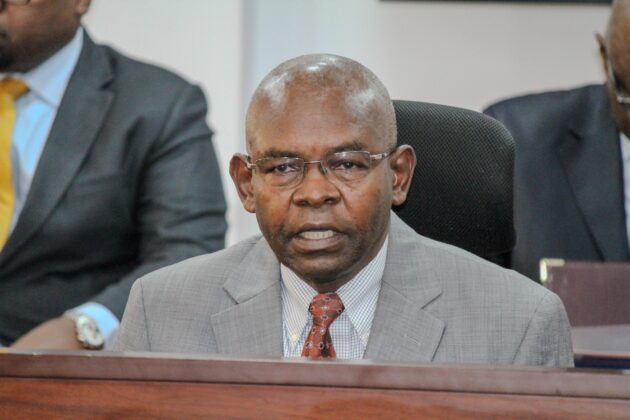
NAIROBI, Kenya July 25 – Central Bank of Kenya (CBK) says it lacks the legal authority to take action against county governments operating unauthorised bank accounts in commercial banks, outside the purview of the national exchequer.
Appearing before the Senate Standing Committee on Devolution and Intergovernmental Relations, CBK Governor Kamau Thugge revealed that the bank has no statutory mandate to compel counties to close accounts that contravene financial regulations.
“Just to identify some of the challenges we face one is the enforcement limitation. There is a lack of a direct mandate by CBK to compel county governments to close unauthorised accounts,” he stated.
His remarks came in response to questions from the committee’s vice chair, nominated Senator Catherine Mumma, who sought clarity on the regulator’s role in streamlining the management of county bank accounts.
According to the 2015 County Government Public Finance Management (PFM) Regulations, all county government accounts except petty cash (imprest) accounts must be held at the CBK.
However, counties have taken advantage of ambiguities in the overarching PFM Act to justify banking with commercial institutions.
Thugge explained that while the regulations are clear, the law itself is not explicit on enforcement or penalties for non-compliance.
“They are using that legal gap to open accounts wherever they wish. The regulations say one thing, but the law is not explicit on enforcement or limitations,” he told the committee, chaired by Senator Mohamed Abass.
Flagged accounts
A recent report by Controller of Budget Margaret Nyakango revealed that counties more than doubled the number of accounts held in commercial banks in the 12 months to March 2025, opening 1,763 new accounts to reach a total of 3,431.
Thugge noted that the current law gives county treasuries discretion to open accounts, without specifying the bank or conditions under which such accounts should be opened.
He added that weak coordination among oversight institutions — including the Office of the Auditor General and the Controller of Budget — has contributed to poor visibility and inconsistent reporting of county accounts.
Further complicating matters is the CBK’s limited branch network, which hampers its ability to serve remote counties. Some devolved units also continue to use commercial banks out of convenience or due to legacy arrangements dating back to before devolution.
Although counties are legally required to copy the Controller of Budget when opening accounts, Thugge said compliance is irregular. “If properly enforced, the Controller of Budget would know every time a county opens an account. That could be a useful enforcement entry point,” he said.
Kiambu Senator Karungo Thangwa criticised CBK for not using its regulatory power over commercial banks to obtain regular disclosures on county accounts.
“You regulate all these commercial banks. Why not issue a circular requiring them to notify CBK every time a county account is opened?” asked Thangwa. “The way banks require documentation for large deposits, they should do the same for county accounts — and report quarterly.”
To address the gaps, CBK is now calling for legislative amendments to align the PFM Act with the 2015 regulations, alongside the creation of a coordinated oversight framework involving the National Treasury, Auditor General, and Controller of Budget.
The regulator is also pushing for the fast-tracking of a National Treasury Single Account (TSA) system, with plans to roll out a county-level TSA by the 2026–2027 financial year.
“The idea is to consolidate all county funds at CBK, with special provisions for donor or petty cash accounts to be maintained elsewhere under strict oversight,” said Thugge.





